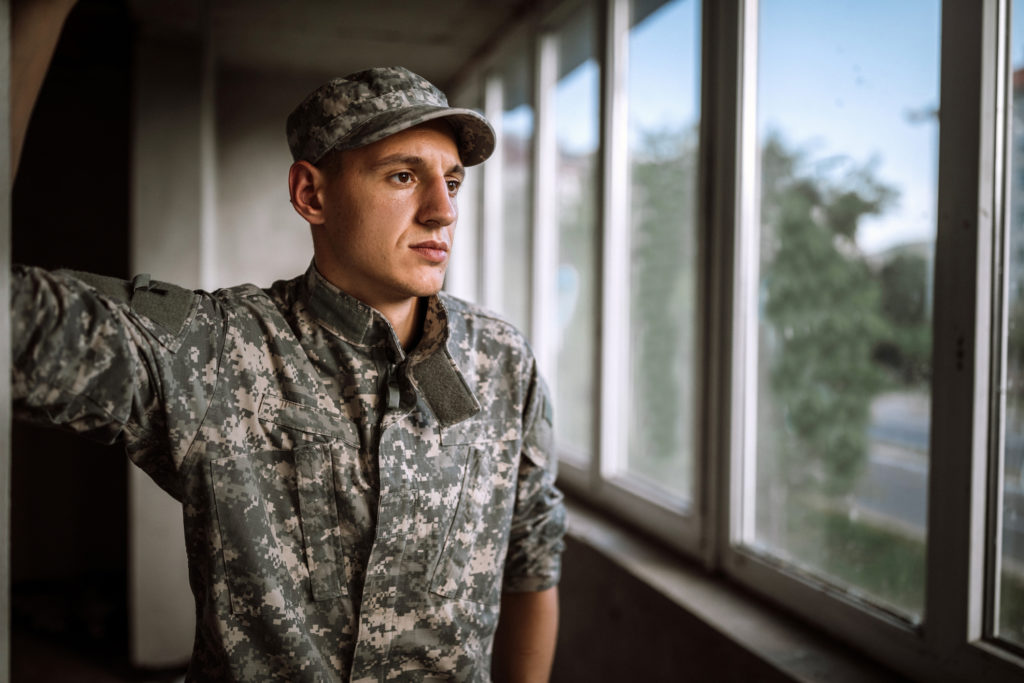How to Help Someone with PTSD From War: A Guide For Family & Friends

Post-traumatic stress disorder (PTSD) is a mental-health condition that can result from experiencing or witnessing a frightening, traumatic event.
Because natural disasters, combat exposure and other violent events can lead to PTSD, veterans and active-duty military members are at high risk. Read on to learn more about how to help someone with PTSD.
Anyone who has a traumatic or intensely stressful event can feel fearful and have trouble adjusting after the event. Most people improve from the experience with time and proper treatment. If the symptoms persist for months or years after the event, however, that could indicate PTSD.
Common symptoms of PTSD include:
- Nightmares
- Avoiding thoughts or places related to the event, or talking about the event
- Overwhelming guilt or shame
- Severe anxiety, fearfulness, or guarded feelings
- Flashbacks or uncontrollable thoughts about the triggering event
According to the U.S. Department of Veterans Affairs, an estimated 30 percent of Vietnam veterans have had PTSD at some point in their lifetime. Between 11 percent and 20 percent of veterans who served in Operations Iraqi Freedom or Enduring Freedom have PTSD in a given year.
Many other cases of PTSD may be unreported, which is why it is important to have resources and loved ones helping veterans with PTSD.
Symptoms of PTSD usually do not appear until weeks, months, and sometimes years after the triggering event. Without proper treatment, PTSD can lead to additional problems, such as panic disorder, depression, substance abuse and suicidal feelings. Therefore, it is vital that anyone who may have PTSD receive appropriate treatment by a mental health provider.
How to Help Someone with PTSD from War
Provide Interpersonal Support to Military Members and Veterans with PTSD
Treatment from a licensed provider is an important step in healing from PTSD recovery. Support from friends and family, however, is also essential for helping veterans with PTSD. Appropriate social support can help prevent someone with PTSD from using unhealthy coping mechanisms, such as drugs or alcohol.
If you have a loved one who has experienced a traumatic event leading to PTSD, there are many ways you can give them support, even if you do not not fully understand their experience. Here are just a few ways to help someone with PTSD from war.
1. Listen.
If your loved one is a veteran with PTSD who wants to talk about what they saw or experienced, encourage them to do so. Maintain a non-judgmental attitude as you listen, and be sure to give them your full attention.
If you want to ask questions, keep them unintrusive. Avoid giving advice or opinions unless your loved one asks for them. Give your loved one plenty of space and time to say what they need to, without rushing them.
2. Help build social support.
However willing you may be to support your loved one with PTSD, you should not be their only source of social support. Encourage them to maintain other relationships and confide in at least one other safe individual.
Social withdrawal is a common symptom among veterans with PTSD. Gently encourage your loved one to participate in social activities and interactions.
3. Create a sense of safety.
Stability is deeply important for veterans struggling with PTSD. While you cannot always drop everything at a moment’s notice, you should take care to be a consistent, steady presence in your loved one’s life.
Respect the veteran’s privacy and understand that everyone has their own timing for recovery. Treat everything your loved one tells you as entirely confidential. (An important exception is if you are genuinely afraid your loved one is about to harm themself or another person.)
Encourage Specialized PTSD Treatment
If your loved one has not already sought and enrolled in specialized treatment for PTSD in veterans, encourage them to do so. This can help minimize the symptoms of PTSD but also reduce the long-term risk of developing additional mental-health conditions and symptoms.
Do some research into the different treatment options for PTSD in veterans. This will not only help you understand what your loved one is experiencing, but also help you understand how to communicate with them.
Some of the different PTSD treatments for veterans and military members include:
- Medication, such as anti-anxiety medication or antidepressants
- Counseling and talk therapy, either one-on-one or in the form of group therapy, which take many forms:
- Chemical dependency detoxification, for individuals struggling with addiction, followed by substance use treatment
- Holistic therapy, such as music or pet therapies
- Educational programs that help teach mindfulness and other healthy coping mechanisms
Self Care for Family & Loved Ones
When caring and supporting someone with PTSD, you should not neglect your own physical and mental health needs.
If you get overwhelmed from supporting your loved one and experience “burnout,” this could cause health issues for you, and limit your ability to help your loved one with PTSD.
A few ways to maintain self-care and help you stay healthy while supporting someone with PTSD include:
- Get enough sleep every night
- Look for a caregiver support group, either locally or online, to reduce feelings of isolation and receive helpful advice from people in similar circumstances
- Get plenty of physical exercise, appropriate to your fitness level
- Practice mindful meditation, such as deep-breathing exercises, to help cope with stress
- Be sure to take time for yourself and have some fun once in a while
PTSD Resources
Many organizations and websites are dedicated to helping veterans with PTSD. Here are just a few of the options available for military family members who want to know how to help someone with PTSD from war and combat.
- Wounded Warrior Project: This non-profit aims to help U.S. veterans and service members who experienced a physical or mental injury on or after September 11, 2001. Wounded Warrior Project hosts programs, promotes community, and offers help to former military navigating civilian life.
- Veterans Crisis Line: If you are a veteran in crisis, or you have a loved one who is, the Veterans Crisis Line can connect you with caring, qualified responders with the U.S. Department of Veterans Affairs (VA).
- National Center for PTSD: Also part of the VA, the National Center for PTSD provides numerous resources and information for veterans with PTSD, as well as family members and healthcare providers.
There is Treatment Available for Veterans and Military Members with PTSD
If you or a loved one struggles with PTSD, there is help and hope available. Help for Heroes is a dedicated treatment program designed specifically for the mental health and substance abuse needs of all first responders, military service members and veterans.
Visit our locations page to find the Help for Heroes facility closest to you. Need immediate help? Active-duty military members can call now for immediate help.


